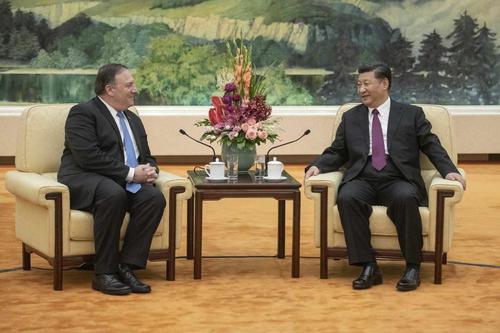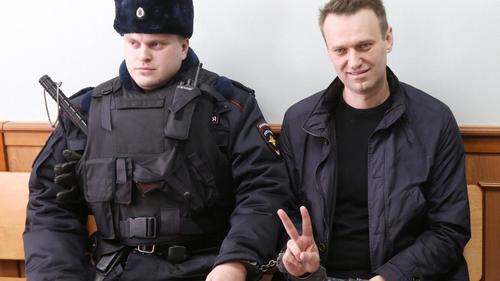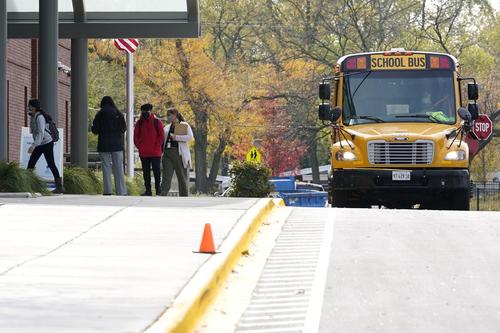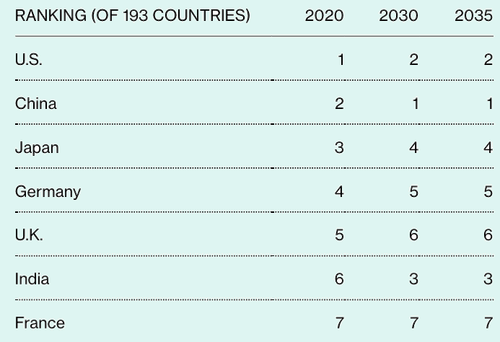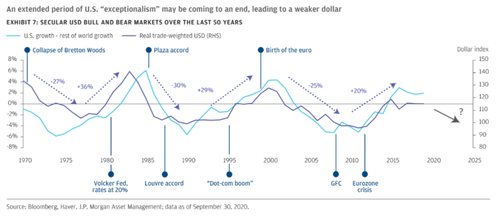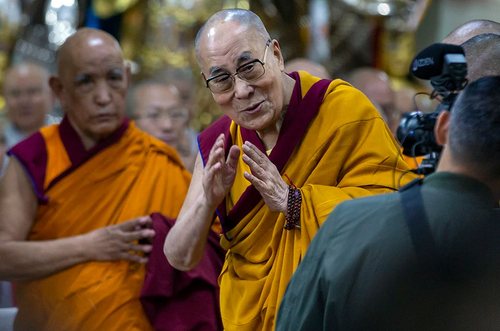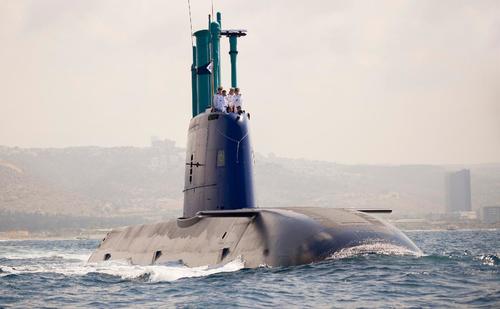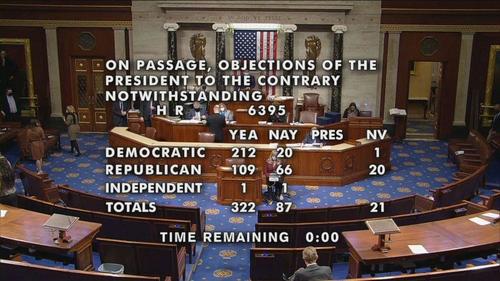“The Elements Of The China Challenge”: A Reply To Critics
Authored by Peter Berkowitz via RealClearPolitics.com,
In mid-November, the State Department’s Policy Planning Staff — I serve as the director — published “The Elements of the China Challenge.”
The paper argues that the core of the challenge consists of the concerted efforts by the Chinese Communist Party to reconfigure world order to serve the CCP’s authoritarian interests and aims. It explains the errors that nourished the hope on both the right and the left that economic liberalization in China, coupled with Western engagement and incorporation of Beijing into international organizations, would bring about China’s political liberalization. It describes the characteristic practices of the communist dictatorship, traces China’s brazen programs of economic co-optation and coercion in every region of the world, examines the Marxist-Leninist dogma and hyper-nationalist beliefs that provide the intellectual sources of the CCP’s quest for global supremacy, and surveys China’s vulnerabilities — both those endemic to authoritarian regimes and those specific to the People’s Republic of China. In conclusion, the paper lays out a framework for securing freedom.
Reaction to the paper has been instructive. The Chinese Communist Party responded with ritual denunciation. In contrast, public intellectuals, scholars, and public officials from around the world have expressed appreciation for the Policy Planning Staff’s efforts to gather in one place the evidence of the CCP’s predatory policies, to distill the party’s governing ambitions, and to sketch a way forward for the United States and all nations dedicated to preserving the free, open, and rules-based international order. The best of the American responses to the paper have coupled praise, in some cases grudging, with strictures, sometimes angry, about the paper’s limitations. The domestic criticisms are especially revealing, both for the serious issues they raise and for the misconceptions that they promulgate.
“The Elements of the China Challenge” has its origins in Secretary of State Mike Pompeo’s reorientation of the State Department — consistent with the Trump administration’s 2017 National Security Strategy and a number of other administration documents — around the new round of great-power competition launched by the CCP. The administration’s attention to the China challenge does not entail — as many mistakenly suppose — that the United States must turn its back to the rest of the world.
To the contrary, the Policy Planning Staff paper stresses that to counter China’s quest for global supremacy, the United States must renew its alliance system and must reform international organizations so that they serve America’s vital interest in preserving an international order that is composed of free and sovereign nation-states and that is grounded in respect for human rights and the rule of law.
Trump administration policy reflects this reorientation. For starters, the administration has led in exposing the CCP’s initial cover up of the COVID-19 pandemic and its subsequent disinformation campaign. The administration intensified efforts to combat China’s massive intellectual property theft. It placed the United States at the forefront of efforts to hold China accountable for gross human rights violations, especially the brutal imprisonment of more than a million Uyghurs in re-education camps in Xinjiang — the United States is the only nation to impose sanctions on CCP officials for these unconscionable abuses. It terminated Hong Kong’s special trading status in the spring, when the CCP crushed freedom in the city. It increased weapons sales to Taiwan, embarked on an inaugural U.S.-Taiwan economic dialogue, and signed a Memorandum of Understanding with Taiwan on health, science, and technology. It invigorated the Quad (Australia, India, Japan, and the United States) and, with its strategy for a Free and Open Indo-Pacific, affirmed the region’s critical importance. It revamped the Development Finance Corporation and reformed the Export-Import Bank to improve the ability of United States and its allies and partners to invest in other nations’ physical and digital infrastructure. And, the Trump administration has convinced more than 50 countries and counting to join the Clean Network, which promises secure telecommunications — unlike the technology offered by Chinese “national champions” Huawei and ZTE, which are CCP extensions whose hardware and software threaten individual privacy and national security.
By stepping back, taking a broader view, and documenting the pattern and purpose of China’s actions, “The Elements of the China Challenge” explains why these policies are urgently needed, and why much more must be done. And by identifying 10 tasks that the United States must undertake — from restoring civic concord at home to, where possible, cooperating with Beijing based on norms of fairness and reciprocity, and to championing freedom abroad — the Policy Planning Staff paper lays the foundations for refashioning U.S. foreign policy to meet the China challenge.
A common theme of the critics, reputable as well as disreputable, is that the paper falls short of the work of George Kennan, a career foreign service officer who in 1947 founded the Policy Planning Staff and became its first director. At the dawn of the Cold War, Kennan’s 1946 “Long Telegram” from Moscow and his 1947 Foreign Affairs article “The Sources of Soviet Conduct” illuminated the threat to freedom posed by the Soviet Union. The most influential documents produced by a State Department official, they served as sources of inspiration for the Policy Planning Staff, but we did not seek to replicate them since, as Kennan well understood, different challenges and moments demand different undertakings and emphases. Above all, today’s Policy Planning Staff learned from Kennan’s insistence on the combination of “ideology and circumstances” that determines great-power conduct, and took to heart his counsel that “to avoid destruction the United States need only measure up to its own best traditions and prove itself worthy of preservation as a great nation.”
As for the disreputable critics, they give no evidence of having read the paper.
The Global Times, a daily tabloid and wholly owned subsidiary of the Chinese Communist Party, was first out of the gate. The CCP newspaper dismissed “The Elements of the China Challenge” the day after it appeared as an “insult to Kennan” amounting to little more than “a collection of malicious remarks from Secretary of State Mike Pompeo and other anti-China U.S. politicians and senators.” At his regular press conference the following day, Foreign Ministry spokesperson Zhao Lijian denounced the Policy Planning Staff paper as “just another collection of lies piled up by the those ‘living fossils of the Cold War’ from the U.S. State Department.”
It would have been more accurate to refer to “the living victors of the Cold War,” but more telling still is the CCP’s failure to notice that the Policy Planning Staff distinguishes the China challenge from the Soviet challenge. While underscoring that, like the former Soviet Union after World War II, China today presents the foremost threat to freedom, the paper also stresses the distinct forms of power at work. “The Soviet Union,” the paper argues, “primarily enlarged its dominions and sought to impose its will through military coercion.” In contrast, and notwithstanding its development of a world-class military, China “primarily pursues the reconfiguration of world affairs through a kind and quantity of economic power of which the Soviets could only have dreamed.”
Of the reputable critics, Odd Arne Westad, a Yale history professor and China scholar, is among the most distinguished. In a Foreign Affairs essay titled “The U.S. Can’t Check China Alone,” he asserts that the “report correctly sees China as the greatest challenge to the United States since the end of the Cold War, showing how Beijing has grown more authoritarian at home and more aggressive abroad.” The paper also, according to Westad, “rightly recognizes how China has tried to gain an advantage by applying economic pressure and conducting espionage — as well as by exploiting the naiveté that causes many foreigners to miss the oppressive nature of the Chinese Communist Party.”
Nevertheless, Westad charges, “the report is limited by ideological and political constraints; given that it is a Trump administration document, it must echo President Donald Trump’s distaste for international organizations, even though they are key to dealing with China.” The professor also takes the paper to task on the grounds that it “almost completely ignores the most basic fact about the current situation, which is that the United States can compete effectively with China only through fundamental reform at home.”
A meticulous scholar of Chinese history, Westad imputes to the Policy Planning Staff paper opinions not found there and overlooks arguments it prominently features. It is not true that our paper, as Westad writes, “suggests that it is now in the United States’ interests to destroy and then selectively rebuild existing international institutions.” Rather, the Policy Planning Staff calls for a reassessment of international organizations to determine where they serve freedom and where they no longer advance the objective for which they were created, arguing for reform where possible and the establishment of new institutions where necessary.
Contrary to Westad, moreover, the Policy Planning Staff highlights the domestic foundations of effective foreign policy. Five of the 10 tasks we identify as crucial to securing freedom involve reform at home — from the renewal of American constitutional government and the promotion of prosperity and civic concord to restoring the U.S. educational system at all levels.
Hal Brands, another reputable critic and leading scholar, finds “valuable insights” in “The Elements of the China Challenge.” Despite the juvenile taunt in the title of his Bloomberg op-ed, “There’s No George Kennan in the Trump Administration,” Brands — a professor of international relations at Johns Hopkins University’s School of Advanced International Studies as well as a Bloomberg columnist — writes that the paper “explains, more completely than any prior U.S. policy document, the sources of Chinese conduct — namely the mix of Marxist-Leninist ideology, extreme nationalism and quasi-imperialism that drives the Chinese Communist Party.” In addition, according to Brands, the paper “shows that China’s objectives are not limited to its immediate periphery, but include fundamental changes in the international system”; it “details the troubling aspects of Chinese behavior, from economic predation to Beijing’s menacing military buildup, as well as the deep vulnerabilities — endemic corruption, inescapable demographic problems, economic instability — that threaten its continued ascent”; and it “outlines reasonable steps America should take to strengthen its position.”
Yet Brands faults “The Elements of the China Challenge” for failing to rise to the ranks of Kennan, whose “brilliance lay in his ability to define an ambitious but ultimately achievable end-state.” Whereas Kennan envisaged a containment policy that would cause the Soviet Union to disintegrate from within, today’s Policy Planning Staff, Brands maintains, “provides no plausible theory of victory” and fails to “clarify what the U.S. seeks to achieve vis-à-vis Beijing.”
It’s true that in a case in which so many have been so wrong for so long and so consequentially about China’s conduct and intentions, the Policy Planning Staff did not pretend to have a knowledge of the future that it does not possess. Indeed, one cannot safely rule out the several possibilities that Brands contemplates: U.S. firmness impelling the CCP to abandon its expansionist aims or triggering internal collapse, or, notwithstanding American firmness, the CCP holding power for generations to come.
Brands, however, misses that the Policy Planning Staff lays out a framework for developing concrete policies consistent with all three possibilities. The paper repeatedly states that the goal of U.S. foreign policy must be to advance American interests by preserving an international order composed of free and sovereign nation-states and grounded in human rights and the rule of law while identifying essential tasks — beginning with adhering to our founding principles and preserving the best in our constitutional tradition — on which the achievement of that goal depends.
Understanding the elements of the China challenge, which encompasses not only knowledge of China but of ourselves, is an indispensable condition for fashioning policies that secure freedom.
Tyler Durden
Mon, 12/28/2020 – 22:20
via ZeroHedge News https://ift.tt/3pu6t6l Tyler Durden
